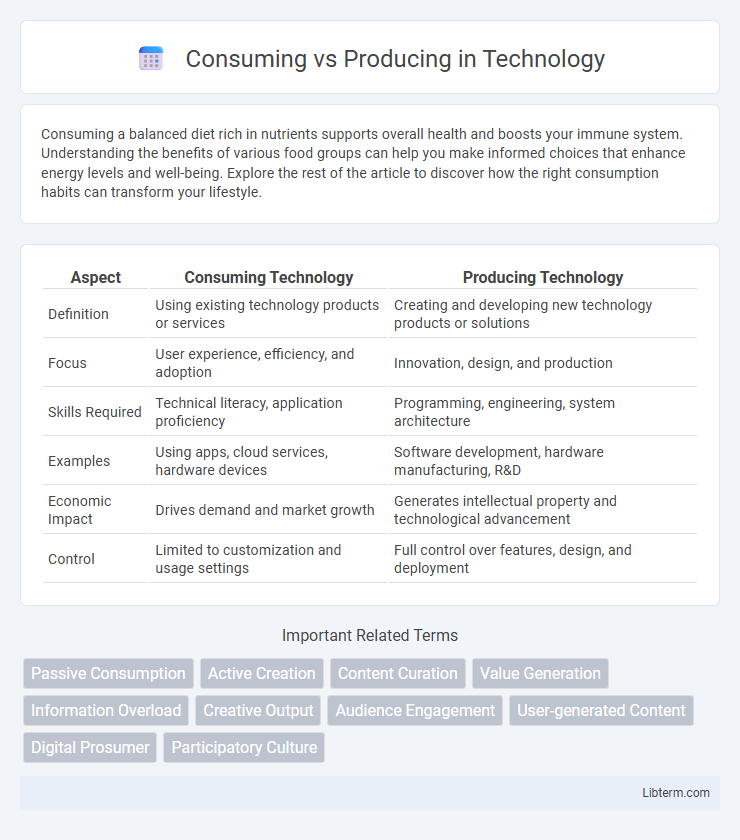Consuming a balanced diet rich in nutrients supports overall health and boosts your immune system. Understanding the benefits of various food groups can help you make informed choices that enhance energy levels and well-being. Explore the rest of the article to discover how the right consumption habits can transform your lifestyle.
Table of Comparison
| Aspect | Consuming Technology | Producing Technology |
|---|---|---|
| Definition | Using existing technology products or services | Creating and developing new technology products or solutions |
| Focus | User experience, efficiency, and adoption | Innovation, design, and production |
| Skills Required | Technical literacy, application proficiency | Programming, engineering, system architecture |
| Examples | Using apps, cloud services, hardware devices | Software development, hardware manufacturing, R&D |
| Economic Impact | Drives demand and market growth | Generates intellectual property and technological advancement |
| Control | Limited to customization and usage settings | Full control over features, design, and deployment |
Understanding Consuming vs Producing
Understanding consuming versus producing involves recognizing the distinct roles individuals play in economic and creative contexts. Consuming refers to the act of using goods, services, or content for personal benefit, while producing entails creating or supplying these goods and services to meet demand. This differentiation highlights the balance necessary for economic growth, where consumers drive demand and producers generate supply.
The Psychology Behind Consumption and Production
The psychology behind consumption and production reveals contrasting motivations and outcomes in human behavior. Consumption often triggers dopamine release linked to instant gratification and emotional satisfaction, while production engages the brain's reward system through creativity, problem-solving, and long-term goal achievement. Research shows that producing content or goods fosters a sense of purpose, self-efficacy, and intrinsic motivation that consumption alone cannot provide.
Benefits of Being a Producer
Being a producer empowers individuals to create original content, driving innovation and personal growth while building a unique brand presence. Producers gain control over their narrative, generating potential income streams and fostering deeper engagement within their audience. This active participation enhances critical thinking and problem-solving skills, distinguishing producers as leaders in their respective fields.
Risks of Excessive Consumption
Excessive consumption leads to resource depletion, environmental degradation, and increased waste generation, intensifying climate change and biodiversity loss. Overconsumption strains supply chains and elevates household debt, creating economic instability and social inequality. Sustainable production and mindful consumption are crucial to mitigating these risks and ensuring long-term ecological and economic health.
Balancing Consumption and Creation
Balancing consumption and creation involves allocating time efficiently between absorbing information and producing original content to foster personal growth and innovation. Excessive consumption can lead to passive learning and reduced productivity, while focused creation enhances critical thinking and skill development. Establishing a routine that integrates deliberate consumption with active production optimizes knowledge retention and creative output.
How to Shift from Consumer to Producer Mindset
Shifting from a consumer to a producer mindset requires prioritizing creation over passive intake by setting clear goals and allocating dedicated time for producing original content or projects. Developing skills through continuous learning and applying knowledge to solve problems fosters a sense of ownership and innovation. Cultivating habits such as proactive decision-making, critical thinking, and sharing valuable insights transforms passive consumption into active contribution in any domain.
Common Barriers to Producing
Common barriers to producing content include lack of time, limited resources, and insufficient technical skills. Mental blocks such as fear of failure or perfectionism often hinder consistent creation efforts. Overcoming these challenges requires structured planning, skill development, and cultivating a growth mindset.
Real-Life Examples of Successful Producers
Successful producers like Elon Musk and Oprah Winfrey exemplify the power of creating content and innovations rather than merely consuming them. Musk's ventures such as Tesla and SpaceX revolutionized electric vehicles and space exploration, demonstrating how producing transformative technology drives industry change. Oprah's media empire, built through original programming and impactful storytelling, highlights the role of content creation in shaping public discourse and culture.
Tools and Techniques to Boost Productivity
Consuming tools such as RSS readers, email aggregators, and content curation platforms streamline information intake by filtering and organizing relevant data. Producing tools including project management software, collaborative platforms, and automation scripts enhance output by facilitating task coordination, real-time teamwork, and repetitive task elimination. Techniques like time blocking, Pomodoro sessions, and the use of templates further amplify productivity by optimizing focus and reducing setup time.
Long-Term Impact of Producing vs Consuming
Producing generates lasting value by creating goods, services, or content that contribute to economic growth and innovation over time. Consuming, while essential for demand, often leads to short-term satisfaction without building sustainable resources or wealth. Long-term impact favors producing as it fosters skill development, wealth accumulation, and societal advancement, whereas excessive consumption can result in resource depletion and financial instability.
Consuming Infographic

 libterm.com
libterm.com